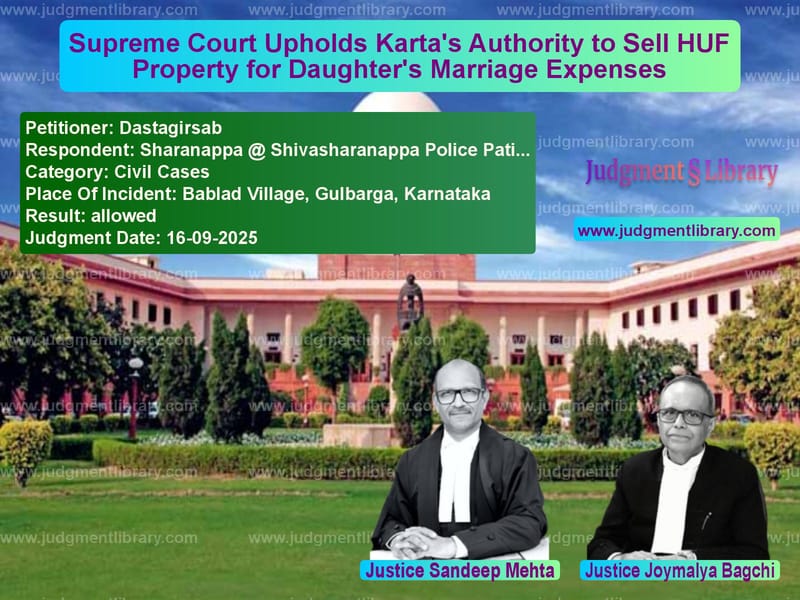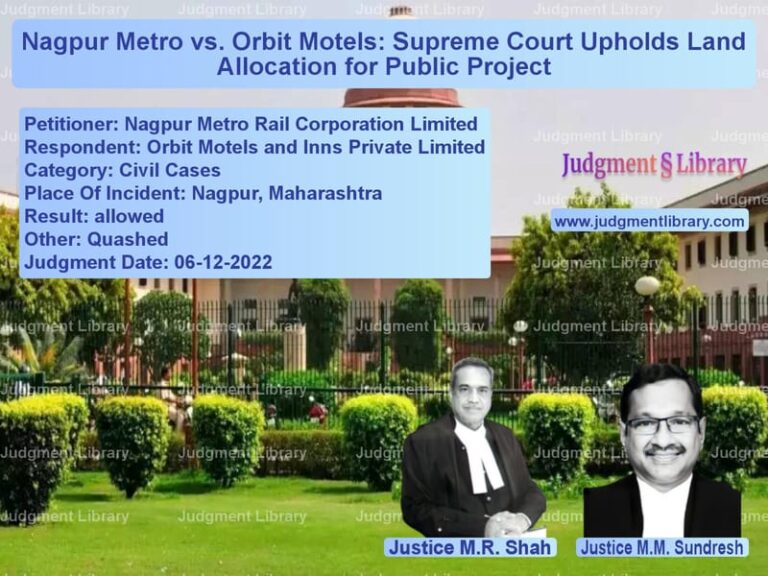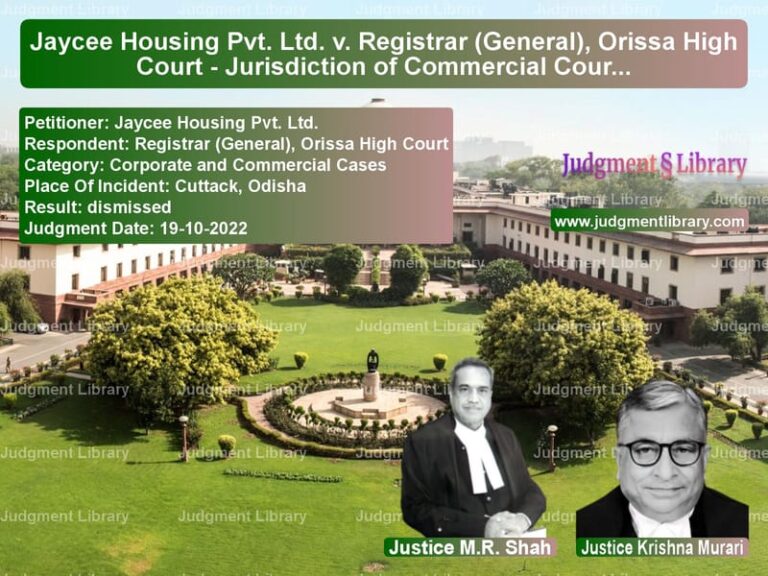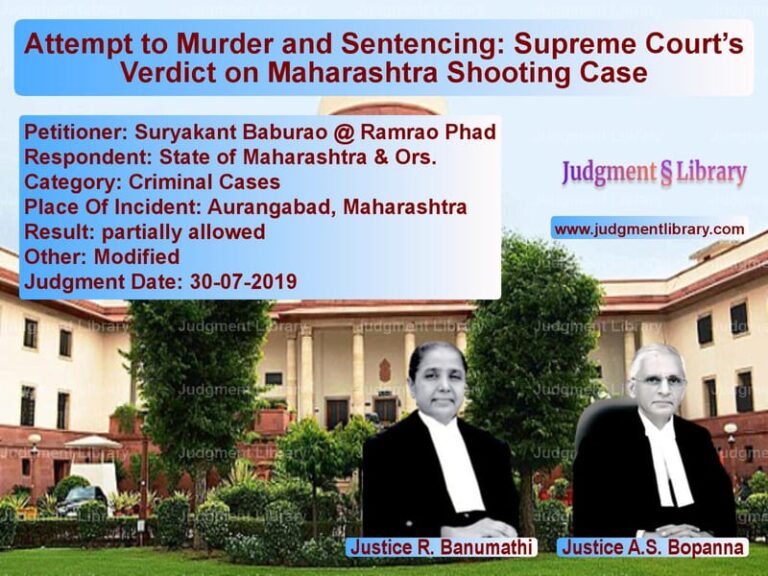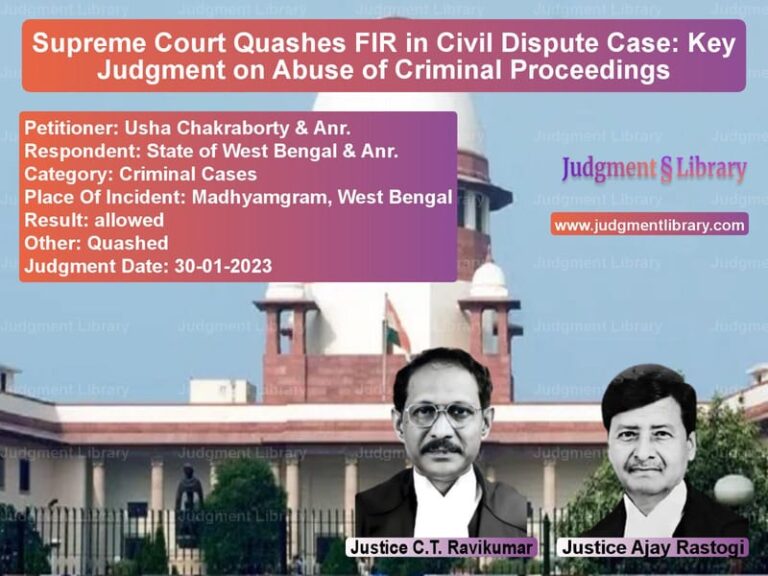Supreme Court Upholds Karta’s Authority to Sell HUF Property for Daughter’s Marriage Expenses
In a significant judgment that clarifies the powers of a Karta in Hindu Undivided Family (HUF) property matters, the Supreme Court has restored the validity of a land sale executed by a family patriarch to meet marriage expenses, overturning the Karnataka High Court’s decision that had declared the transaction null and void. The case involved a complex family dispute between Dastagirsab, the purchaser of the property, and the sons of Sharanappa, the Karta who had sold the ancestral land.
The legal battle centered around 9 acres and 1 gunta of land in Survey No. 49/2 of Bablad Village in Gulbarga, Karnataka, which belonged to a Hindu Undivided Family consisting of Sharanappa (the Karta) and his four sons – Kashiraya (the plaintiff), Bhimaraya (2nd defendant), Mahalingappa (3rd defendant), and Ravichandra (4th defendant). The dispute began when Kashiraya filed a suit challenging the sale of this ancestral property to Dastagirsab (5th defendant) through a sale deed dated July 26, 1995.
The plaintiff’s case was that his father, Sharanappa, was addicted to alcohol and indulged in bad habits, selling various parcels of HUF land to fund his extravagant lifestyle. According to the plaintiff, when he objected to these sales, his father promised to make fixed deposits in the names of all his sons and assured that he would not sell the suit land. The plaintiff alleged that while no money was deposited for him or the second defendant, substantial amounts were settled in favor of the third and fourth defendants, who then colluded with their father to execute the sale deed in favor of Dastagirsab without consideration or family necessity.
Read also: https://judgmentlibrary.com/supreme-court-upholds-landowner-rights-in-haryana-bachat-land-case/
The plaintiff claimed he was unaware of the sale transaction until December 1999 because possession had not been handed over to the purchaser. When the defendants failed to cancel the deed as promised and tried to alienate the land to other parties, he filed the suit seeking declaration that the sale deed was null and void, along with partition and separate possession of his share in the suit land.
Dastagirsab, the purchaser, contested these allegations vigorously. He contended that Sharanappa had agreed to sell the suit land for valuable consideration and had received Rs. 1,00,000 as advance on June 18, 1994, against an agreement for sale. This agreement and money receipt were signed by Sharanappa’s wife Siddamma, daughter Kashibai, and the fourth defendant. On July 26, 1995, Sharanappa received the remaining consideration and executed the sale deed, which was signed by the third and fourth defendants. The purchaser argued that the sale was executed for legal necessity – specifically for the marriage of Sharanappa’s daughter Kashibai – and that he had been put in possession of the suit land as evidenced by mutation certificates and land revenue records.
The Trial Court, after examining the evidence, dismissed the plaintiff’s suit, holding that the suit land belonged to the HUF and that Sharanappa had sold various parcels of land to meet the family’s financial needs. The court specifically found that the suit land was sold to meet the expenses of Kashibai’s marriage, constituting legal necessity.
However, the Karnataka High Court reversed this decision and allowed the suit. The High Court held that the purchaser had not specifically denied the plaintiff’s case and had not made due enquiry about how the sale consideration was utilized. The High Court concluded that the purchaser had not adduced any evidence regarding legal necessity and found the plea about Kashibai’s marriage untenable since she had been married earlier.
The Supreme Court bench comprising Justices Sandeep Mehta and Joymalya Bagchi carefully analyzed the legal principles governing HUF property alienation. The court extensively discussed the rights of a Karta to sell joint family property, citing established precedents including Beereddy Dasaratharami Reddy vs. V. Manjunath & Anr. The judges noted: “Right of the Karta to execute agreement to sell or sale deed of a joint Hindu family property is settled and is beyond cavil wide several judgments of this Court… wherein it has been held that a joint Hindu family is capable of acting through its Karta or adult member of the family in management of the joint Hindu family property.”
The court further elaborated on the concept of legal necessity, quoting from Mulla’s Hindu Law: “What is legal necessity was also succinctly said by Mulla in Article 241, which reads as under: ‘Article 241 – 241. What is legal necessity.—The following have been held to be family necessities within the meaning of Article 240: (a) payment of government revenue and of debts which are payable out of the family property; (b) maintenance of coparceners and of the members of their families; (c) marriage expenses of male coparceners, and of the daughters of coparceners; (d) performance of the necessary funeral or family ceremonies; (e) costs of necessary litigation in recovering or preserving the estate; (f) costs of defending the head of the joint family or any other member against a serious criminal charge; (g) payment of debts incurred for family business or other necessary purpose.'”
The Supreme Court made several crucial observations about the evidence in the case. The judges noted that while the plaintiff alleged that previous sales of HUF properties were for Sharanappa’s extravagant habits, he had not challenged any of those transactions. The court found that “the Trial Court rightly inferred the earlier sale transactions of HUF properties were for financial needs and the plea that the previous HUF assets were disposed of to meet the Karta’s extravagant habits was an afterthought.”
Regarding the specific sale to Dastagirsab, the Supreme Court criticized the High Court for overlooking crucial evidence. The judges noted: “It is true Kashibai’s marriage had taken place in 1991, couple of years prior to the 1st defendant-Karta entering into sale of the suit property for valuable consideration. It is common knowledge families incur heavy debts to perform marriages of their daughters and such debts have a cascading effect on family finances down the years.”
The court emphasized that “the money receipts for the sale consideration were signed by two of the coparceners, as well as the 1st defendant’s wife and daughter Kashibai, whose marriage expenses are stated to be the reason for the sale. These circumstances demonstrate expenses borne by the coparceners in respect of Kashibai’s marriage created financial stress on the family leading to the sale of the suit land.”
The Supreme Court also addressed the High Court’s finding that the purchaser should have made enquiries about how the sale consideration was distributed. The judges held: “We are conscious that the onus to prove that a sale made by the Karta on behalf of other coparceners of HUF for legal necessity lies on the alienee/purchaser. The 5th defendant-purchaser, through deft cross examination of the plaintiff and other evidence, has established a clear nexus between the sale transaction and the expenses undertaken for Kashibai’s marriage and has thereby discharged the onus.”
The court further observed that “Onus of proof on the stranger-purchaser cannot run counter to the principle of reverse burden enshrined in Section 106 of the Evidence Act, 1872 and saddle him with the liability to prove facts which are within the special knowledge of the coparceners of the HUF.”
The Supreme Court also noted the plaintiff’s conduct in challenging the sale transaction five years after it occurred, stating that this “raises grave doubt regarding his bona fides.” The plaintiff’s explanation that he was unaware of the sale because possession had not been parted with was described as “wholly facetious” given the evidence of mutation certificates and land records showing the purchaser’s possession.
In its conclusion, the Supreme Court stated: “In fine, we are of the view the High Court erred in holding the sale in favour of 5th defendant was not for legal necessity and the latter was not a bona fide purchaser for valuable consideration. As such, we set aside the impugned judgment and decree of the High Court and uphold the judgment of the Trial Court dismissing the suit.”
This judgment reinforces the well-established principle that a Karta of an HUF has wide discretion in managing joint family properties and can alienate them for legal necessities, including marriage expenses of family members. The decision also clarifies the burden of proof in such cases and protects bona fide purchasers who transact with Kartas after establishing legal necessity for the alienation.
Petitioner Name: Dastagirsab.Respondent Name: Sharanappa @ Shivasharanappa Police Patil (D) by LRs. & Ors..Judgment By: Justice Sandeep Mehta, Justice Joymalya Bagchi.Place Of Incident: Bablad Village, Gulbarga, Karnataka.Judgment Date: 16-09-2025.Result: allowed.
Don’t miss out on the full details! Download the complete judgment in PDF format below and gain valuable insights instantly!
Download Judgment: dastagirsab-vs-sharanappa-@-shivash-supreme-court-of-india-judgment-dated-16-09-2025.pdf
Directly Download Judgment: Directly download this Judgment
See all petitions in Property Disputes
See all petitions in Succession and Wills
See all petitions in Other Cases
See all petitions in Judgment by Sandeep Mehta
See all petitions in Judgment by Joymalya Bagchi
See all petitions in allowed
See all petitions in supreme court of India judgments September 2025
See all petitions in 2025 judgments
See all posts in Civil Cases Category
See all allowed petitions in Civil Cases Category
See all Dismissed petitions in Civil Cases Category
See all partially allowed petitions in Civil Cases Category

